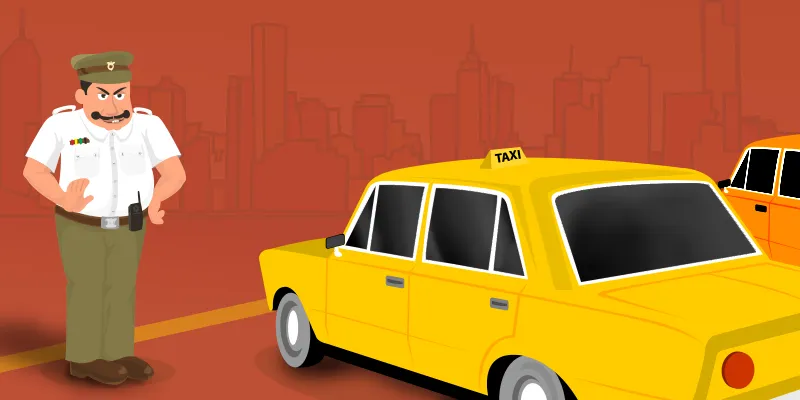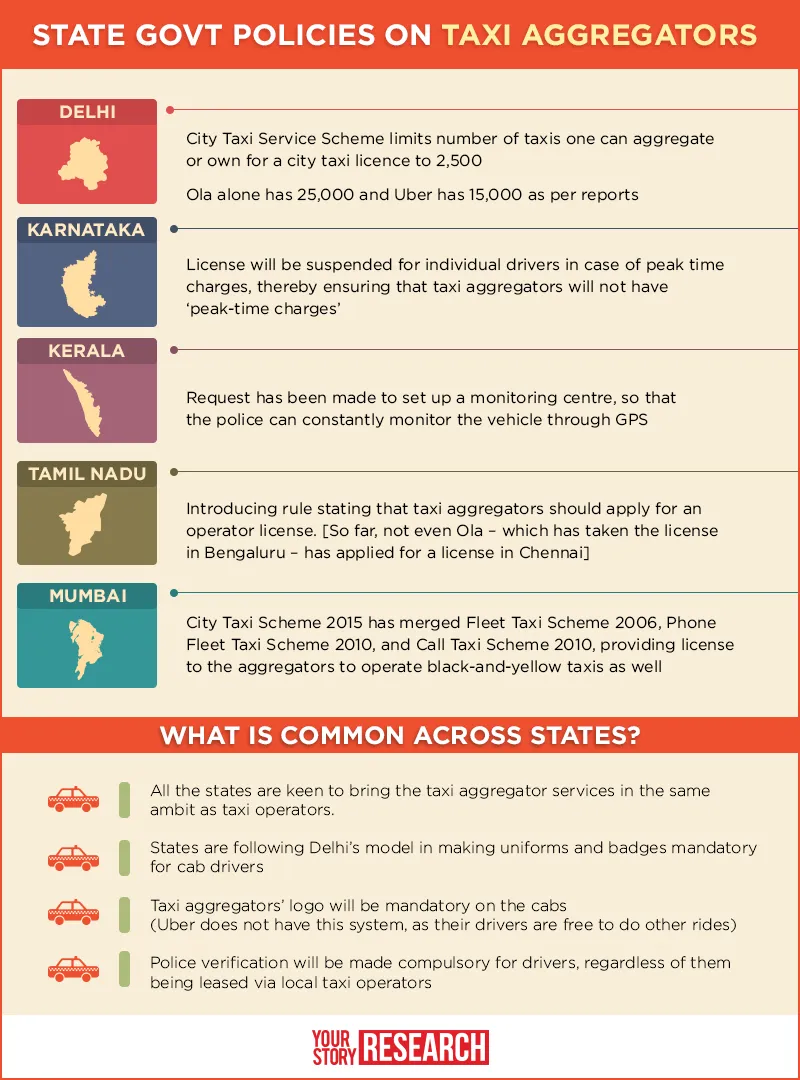New State policies could spoil the party for taxi aggregators like Ola and Uber

Ola and Uber drivers could pretty soon see their licenses getting suspended in Karnataka if they resort to peak-time charges or surge pricing. In Delhi and Tamil Nadu, among other States, taxi aggregators will need to get operators’ license to run their service, and in Kerala the police wants to monitor their fleet-on-the-ground constantly. These are just some of the policies that various States in India are set to introduce, most likely in the next couple of months.
Taxi aggregators in India have gotten into trouble with the authorities the last couple of years due to their new business model. Both Ola and Uber claim to be tech platforms and not taxi operators—something that current policies don’t cover.
Earlier this year, the Central government issued guidelines authorising various States to draft their own laws for regulating taxi services. The restructured rules are currently under scrutiny by State governments, and should be implemented before the year is out.
The problem for Ola and Uber is that they will need to put in place measures to comply with very different set of policies that each State is introducing. Ola and Uber declined to comment for this story.
The common argument put forward by State governments is that taxi aggregators need to take license under Section 93 of the Indian Motor Vehicle Act, which states that without an operator license, ‘no person shall engage himself—as an agent or a canvasser, in the sale of tickets for travel by public service vehicles or in otherwise soliciting customers for such vehicles.’ This essentially means that Ola and Uber will have to take the operators’ license.
Ola already has this license in Bengaluru, according to Karnataka Transport Department officials.
Capital issues
A few weeks ago, the Delhi High Court again rejected Uber’s plea for an operating license in the city on the grounds of not complying with the ban which was imposed on it last year, and for not meeting requirements such as installation of digital meters, GPS, and government-approved fares. Ola does not have a license in Delhi either so far. Despite this, both Uber and Ola are operating in Delhi. Ola has over 30,000 cabs in Delhi-NCR.
“Although the City Taxi Service Scheme 2015 allows aggregators to come in as licensees to operate taxis, Uber and Ola have been rejected because they have been violating court orders and are not accepting the norms of the scheme per se,” says Anand Tiwari, Joint Transport Commissioner, Delhi. This law brings aggregators and normal operators in the same category. The transport department is contesting Uber’s claim that they are a technology platform. “It has been upheld by the Delhi HC that they have to comply with the norms of the taxi service scheme,” Tiwari said.
The Supreme Court, in 2001, mandated that public service vehicles in Delhi should be CNG-run. According to Tiwari, although the High Court had ordered them to file an affidavit not to ply diesel vehicles in Delhi, the taxi aggregators have not been obeying it. “We are taking enforcement action; plying without license in the city itself is violation of law. They have to comply with the norms on drivers’ background verification, panic button, CNG cabs, GPS tracking system, government-declared fares, and public service badge for the drivers etc. to get the license.”
The alleged rape in December 2014 of a woman passenger by the cab driver during a trip booked on Uber put the spotlight on safety of passengers using these services. There is now a requirement in Delhi to have a physical panic button inside the cabs, not just the SOS feature that the operators have added to their apps.

The curious case of the South
In August, the Kerala State Transport Department sent new proposals on taxi aggregator services for approval to the State government. “Uber had asked us to make provision for giving them license to operate. But since the aggregator service itself is a new concept, it is impossible for us to bring them into a framework without any law, which makes this step necessary,” says Joint Transport Commissioner (Enforcement and Modernisation) Rajeev Puthalath. Ola and Uber launched services in Kerala earlier this year.
According to the proposal, their drivers should have police clearance; the service provider should have their proof of address, and provide them with identity cards. “We want the police to be able to monitor these cabs through GPS; so we have requested the State government to set up a monitoring centre,” Rajeev told YS.
Kerala’s neighbour Tamil Nadu also did not have a license system for aggregators so far. The Tamil Nadu Transport Department has now made a proposal to the State government to include the aggregators in the same category as taxi operators, so that they too are eligible for the operator’s license. “Some aggregators have approached the Transport Commissioner for license, but so far we have not given it as there is no framework for it,” says P. Vijayaraj, Joint Transport Commissioner (Rules and Road Safety), Tamil Nadu. Ola alone has more than 13,000 cabs in Chennai.
Karnataka government is also following suit. “We are likely to come out with a draft within the next fortnight,” said P Ravikumar, Additional Chief Secretary, in an email. However, Additional Commissioner for Transport HG Kumar told YourStory that once the City Taxi Scheme (1998) for Bengaluru is restructured, there will be stricter rules on fare structure and city permits. “Uniform regulations have been given by the Ministry of Road and Transport Highways for all of India. Based on that, we have made a proposal,” he said. The 1998 Act will be redrafted with definitions for web-based operators, aggregators, and solicitors and any form of surge pricing will be penalised.
YourStory’s take
It is appreciable that States have now become proactive about coming up with policies related to taxi aggregators, since Ola, Uber and other aggregators will now not have to deal with ambiguity. However, many states are coming up with different policies and that is sure to put more pressure on the aggregators. Ola and Uber officials will then have to be on their toes to ensure they are compliant according to the various laws.







